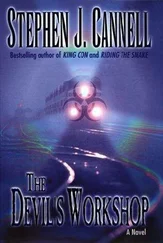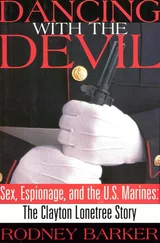Алан Джадд - The Devil's Own Work
Здесь есть возможность читать онлайн «Алан Джадд - The Devil's Own Work» весь текст электронной книги совершенно бесплатно (целиком полную версию без сокращений). В некоторых случаях можно слушать аудио, скачать через торрент в формате fb2 и присутствует краткое содержание. Жанр: sf_mystic, на английском языке. Описание произведения, (предисловие) а так же отзывы посетителей доступны на портале библиотеки ЛибКат.
- Название:The Devil's Own Work
- Автор:
- Жанр:
- Год:неизвестен
- ISBN:нет данных
- Рейтинг книги:3 / 5. Голосов: 1
-
Избранное:Добавить в избранное
- Отзывы:
-
Ваша оценка:
- 60
- 1
- 2
- 3
- 4
- 5
The Devil's Own Work: краткое содержание, описание и аннотация
Предлагаем к чтению аннотацию, описание, краткое содержание или предисловие (зависит от того, что написал сам автор книги «The Devil's Own Work»). Если вы не нашли необходимую информацию о книге — напишите в комментариях, мы постараемся отыскать её.
The Devil's Own Work — читать онлайн бесплатно полную книгу (весь текст) целиком
Ниже представлен текст книги, разбитый по страницам. Система сохранения места последней прочитанной страницы, позволяет с удобством читать онлайн бесплатно книгу «The Devil's Own Work», без необходимости каждый раз заново искать на чём Вы остановились. Поставьте закладку, и сможете в любой момент перейти на страницу, на которой закончили чтение.
Интервал:
Закладка:
I was surprised that he had permitted the publicity about his using one, supposedly so long after most writers, but he just shrugged. It was only later when he told me about the gibberish that I learned that this, like his typing, had been another failed attempt to regain his own voice. The writing, the manuscript, the scratching, would not let him go. Everything he tried on the machine came out as gibberish. He would begin a normal sentence, pressing what he thought were the right keys, and the green screen would show nonsense. He knew it was not the machine, which had been demonstrated to work, but something within him. He tried typing the gibberish exactly as he read it in the manuscript, to see if it would come out sense as it did when he used his pen, but it would not translate. That was the experiment I saw. It — whatever it was — was as jealous of other forms of transcription as of his having ideas of his own. He was blocked, driven back to the scratching and his own pen. Thus the book that was hailed as such a success was, for Edward, utter defeat.
The most important defect of that book, though, was its lack of honesty. Honesty is what gives a book its centre of gravity and if it lacks it, though it has all the other virtues, it will be forever pretending to be something it never quite is. That, at least, is my opinion and it was because of that book that I began re-reading its predecessors with a different eye. What I saw reminded me of what he had said about Tyrrel's work being a dance around emptiness. That is now, of course, the conventional view of Edward's work. I record this not to claim prescience but because I want to show how a potentially great writer was destroyed and because I am sure it did not begin with Tyrrel or end with Edward.
He was aware of the book's faults. One evening we dined alone at Englert's and lingered until most of the customers had gone. The shutters were closed and M. Englert sat with some friends at the big table, talking football. I felt relaxed enough to be nearly frank. I told Edward that his book struck me as more of a contrivance than the others — skilful, entertaining, with dazzling language and wit but in the end less meaning.
'Sound and fury signify not nothing but nothingness,' he said. 'That is the point.'
'You did it deliberately?'
'It was deliberate.' He spoke carefully. 'There is nothing accidental in my books.'
'Of course not.'
'No, not of course. With most writers there is much that is accidental. They reveal themselves in every other sentence. They can't help it and they don't always know what they're revealing but they have to do it because for them it's part of the process. Yet what do you see of me in my writing?'
It was true that there was nothing of Edward as I knew him, but what did I know of him? Not much when I thought about it, and I realized that I regarded his novels as characteristic of him only because they resembled each other; there was no point at which they seemed to attach to him. But still I did not fully understand what he was saying. I thought he meant to be the kind of artist Joyce wrote about, Godlike, remote, refined almost out of existence, paring his fingernails.
He shook his head. 'I mean that my writing is nothing to do with me.'
'You regard it all as an experiment, then?'
'That is how it started.'
I learned no more that night. Now I know what a driven man he was, unable to write a word of his own even in a letter, possessed, stifled, terrified, I can only admire the way he continued to fight it when others, Tyrrel among them, must have acquiesced. His apparent self-possession was really the fragile stasis of an ancient vase and if he had let himself be moved, or show feeling, he would have broken into a thousand pieces. He came as close as he dared to telling me on that occasion but until the very end his fear of Eudoxie held him back. He was her prisoner; she surrounded him with everything he wanted and in exchange she and that manuscript took possession of his soul. As time went by he wanted less and less of other things, desiring only the one thing he could not have. He tried to fight them but you need spirit to fight and it was his spirit they claimed. How he kept on I do not know; but I do know that during all those years when I was seeing my friend what I took for the calm acceptance of worldly success and the clear-sighted indifference of genius was in fact the stillness of near-catatonic frenzy, the quiet of near-total despair.
The Antibes years, as I think of them, came to an end when Edward and Eudoxie announced they were going to travel. We did not know how long a break this was to be and I don't think they did either. We imagined they would go round the world for a year or so. Chantal and I stayed, of course, but I never think of our remaining years there as Antibes years, more a kind of footnote. The great events had happened already.
The night before Edward and Eudoxie were to leave there was a buzz on our entryphone. I was surprised to hear Edward's distorted voice since it was unprecedented for him to drop by. I went out into the corridor to meet the lift but he ran up the stairs. He was flabby and untidy, his face was red and his hair wet with exertion. He wore a light suit that had had something spilt on the trousers and his tie was askew. He was breathing heavily.
'I can't Stop, I'm in a hurry,' he said. 'I wondered if you'd look after this for me until I get back.' He handed me a manuscript in a supermarket carrier bag. 'Didn't want to leave it in the house. Too heavy to cart around. Got enough as it is.'
I had never seen him hurried or flustered. Chantal stood just behind me, saying nothing. He left no time for questions.
'Thanks,' he said. 'Be in touch.' He ran back down the stairs.
I know now that the manuscript was the one he had from Tyrrel but I didn't look at it that night, hindered by some rare scruple — which no doubt I should have overcome the next day — and anyway distracted by Chantal.
'She's driven him away,' she said. 'Who?'
'Eudoxie.'
'But she's going with him.'
'I don't care. She's driving him away.' She went into our bedroom and shut the door.
The next morning the buzzer went again bur this time it was Eudoxie. We had just finished breakfast and I was about to leave for school. She wanted to come up, she said. Edward had left a manuscript last night which he had now decided he wanted; also, she wanted to say goodbye.
'Tell her you'll take it down with you,' said Chantal. 'Don't you want to say goodbye?'
'You say it for me.' She got up and went into the kitchen.
The girls were also ready for school and so they came down with me. Eudoxie was smiling and calm, quite unlike Edward. She made a fuss of the girls, promising them all sorts of things from abroad and complimenting them on their appearance. Her own was striking: she wore a white, tightly waisted suit, her hair was pinned back, her dark eyes just sufficiently emphasized, her lipstick bright and from her ears swayed pendulous gold medallions. What in most women would seem too cosmetic in her came into its own. She was laughing and charming and the girls were entranced. She was even mildly flirtatious with me.
'My love as always to Chantal,' she said, kissing me lightly on the lips.
I held her hand for a moment too long. She smiled and turned to the girls. She could have passed for twenty.
Edward and Eudoxie were itinerant from then on. They kept the house at Cap Ferrat and occasionally revisited but never for long. When I saw him there was never much said. Not that there needed to be. Our friendship was an acknowledgement that we went back a long way, that there was more behind than to come. I don't think either of us had the linear view of relationships which demands progression towards — well, what? That is always the problem.
Читать дальшеИнтервал:
Закладка:
Похожие книги на «The Devil's Own Work»
Представляем Вашему вниманию похожие книги на «The Devil's Own Work» списком для выбора. Мы отобрали схожую по названию и смыслу литературу в надежде предоставить читателям больше вариантов отыскать новые, интересные, ещё непрочитанные произведения.
Обсуждение, отзывы о книге «The Devil's Own Work» и просто собственные мнения читателей. Оставьте ваши комментарии, напишите, что Вы думаете о произведении, его смысле или главных героях. Укажите что конкретно понравилось, а что нет, и почему Вы так считаете.











